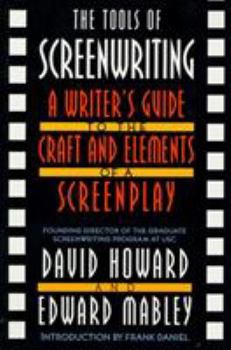The Tools of Screenwriting: A Writer's Guide to the Craft and Elements of a Screenplay
Select Format
Select Condition 
Book Overview
A Writer's Guide to the Craft and Elements of a Screenplay
Format:Paperback
Language:English
ISBN:0312119089
ISBN13:9780312119089
Release Date:January 1995
Publisher:St. Martin's Griffin
Length:320 Pages
Weight:0.76 lbs.
Dimensions:0.8" x 5.4" x 8.5"
Customer Reviews
5 ratings
A few SIMPLE TIPS on how to write a SOLID STORY
Published by Thriftbooks.com User , 16 years ago
I used to teach a film class--so I had to review a lot of texts on screenplays--and this one was by FAR the best. It gives a very simple--yet incredibly helpful--"formula" for creating a successful storyline. (FYI--the authors accept the irony inherent in employing a formula for dramatic ends.) I would recommend it for anyone who wants to write a good narrative:short story, novel, screenplay, comic, etc. It made all the difference in the quality of my students' screenplays!
An indispensable Tool.
Published by Thriftbooks.com User , 23 years ago
I can't praise enough this book. The First section explain the Basic about Storytelling, the Second section expose The Screenwriting Tools, the Third Section from the page 100 to the end provide an Analyses of 16 Films using the following tools/elements: Protagonist and Objective, Conflict, Obstacles, Premise and Opening, Main tension, Culmination and Resolution, Theme, Unity, Exposition, Characterization, Development of the History, Dramatic Irony, Preparation and Aftermath, Planting and Payoff, Plausibility, Action and Activity, Dialogue, Visuals, Dramatic Scenes.My conclusions: 1) The information is clear and concise explaining the essential elements of a script 2) The Analyses Section provides examples in depth 3) The book is cheapIs a favorite between my 12 books about Writing, you can't go wrong with this bok even if you are a Pro because the analyses of the films provide you a comparative of the central principles of a good movie.
Masterful! Brilliant! Amazing!
Published by Thriftbooks.com User , 25 years ago
Forget all of the other books out there...or, buy the other books, but make this one first on your list. Howard and Mabley are both accomplished professional writers and they know their tools of the craft, which they now share with you. This book succeeds immensely simply because it lists the elements of a screenplay and tells how each is best used and why. It has all of the basic elements: Dialogue, Dramatic Irony, etc. But ever heard of "Preparation and Aftermath", "Future and Advertising", "Planting and Payoff", or "Plausibility"? If not, then learn how to include them in YOUR screenplay to make it better, more exciting, and more fulfilling in a dramatic and universal way. Absolutely the best book on screenwriting. Period. Buy it now. I have read it a countless number of times and each time I learn something new or it spurs my imagination to create something new in the world of my screenplay. Please do yourself a favor and get a hold of this book. A masterpiece of screenplay instruction.
A Book to Read
Published by Thriftbooks.com User , 25 years ago
"Tools" is written by an intellectual with many years under his belt. He starts from the bottom up, and teaches you writing from the most basic levels to the most complex of ideas. This book not only improves your screenwriting skills by leaps and bounds, but enriches your movie-going experience.
********** TEN STARS! ABSOLUTELY BUY THIS BOOK FIRST!
Published by Thriftbooks.com User , 26 years ago
This book is ABSOLUTELY the best on the subject. And I've read _all_ of them: Field, Froug, Hunter, Seger, Halperin, and many more. The analyses of clasic and newer films are exhaustive and the "Tools" section provides an indispensible guide for any writer. It sits right next to my computer. When I sell my first screen play, David Howard will be the first one I call to say "Thank you."





